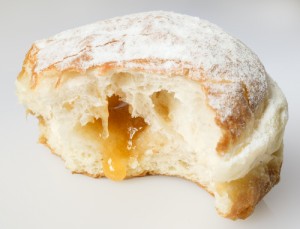 A secret to a healthy body, whether you are diabetic or not, is to eat the right foods the right way. Nutritionists recommended keeping your blood sugar level reduced to prevent sudden increases of insulin. Although the main culprit of insulin spikes is starch, you do not have to eliminate carbohydrates entirely in your diet.
A secret to a healthy body, whether you are diabetic or not, is to eat the right foods the right way. Nutritionists recommended keeping your blood sugar level reduced to prevent sudden increases of insulin. Although the main culprit of insulin spikes is starch, you do not have to eliminate carbohydrates entirely in your diet.
A new book entitled “The Sugar Blockers Diet” provides tips on taking advantage of natural substances in food that would help slow down carbohydrate digestion and entry into the bloodstream. Keeping your blood sugar level at neutral–not too high, not too low–can actually help your body burn fat, which everyone can achieve with together with a balanced diet and exercise.
Have a fatty snack – Eat snacks that have up to a teaspoon of fat, such as a handful of nuts or a piece of cheese, 10 to 30 minutes before your meals. You actually remain fuller longer, thanks to how fat helps in slowing down your stomach’s digestion of food.
Start your meal with a salad – Soluble fiber found in plants absorbs starch and sugar like a sponge in your intestines. The soluble fiber eventually dissolves and slowly releases glucose, making your body require less insulin to handle it. A rich source of soluble fiber is salads, which you should eat before consuming any starch.
Take some vinegar – Vinegar has high amounts of acetic acid that helps deactivating amylase, an enzyme that turns starch into sugar. It does not matter what kind of vinegar you use, as long as you take it in moderation (about half a tablespoon before meals). You can use it as salad dressing or use it as an alternative for salt. Vinegar also increases the body’s sensitivity to insulin. Take note that amylase only acts on starch only, so while vinegar will help your body as you eat bread, it does not when you eat candy.
Include protein in your meal – Protein has an unusual way of helping your body reduce insulin spikes: by making your body secrete insulin so fast that it keeps your blood sugar from rising as high later.
Keep your vegetables lightly cooked – While vegetables contain helpful soluble fiber, cooking them to mush would saturate the fiber before you even eat it. That is because the soluble fiber has absorbed water instead of sugar and starch in your body. Also, eating crispy, lightly cooked vegetables remain chunky when they reach your stomach; and larger food particles take more time to digest, thus keeping you fuller.
Drink a glass of wine with dinner – Alcohol has unique properties in blocking sugar into your bloodstream. Your liver normally converts some of the fat and protein in your bloodstream into glucose, which adds to the glucose already converted from the starchy foods you eat. However, alcohol taken with a meal temporarily halts your liver’s glucose production. Any alcohol will do, whether it is beer, wine, or a shot of hard liquor. Take note that just one glass of alcohol is all you need, and that sugar-loaded cocktails are not recommended.
Eat sweets at the end of the meal – Eating desserts on an empty stomach leaves your body unprepared for the sudden rush of sugar into the bloodstream. Meanwhile, take in sweets to the end of the meal and your body has all the built-in protection–from fat to soluble fiber, from protein to acetic acid. You can eat as much sweets as you can hold in the cup of your hand.
Source: Prevention
Tags: foods to reduce insulin, starch blocker, sugar blockers